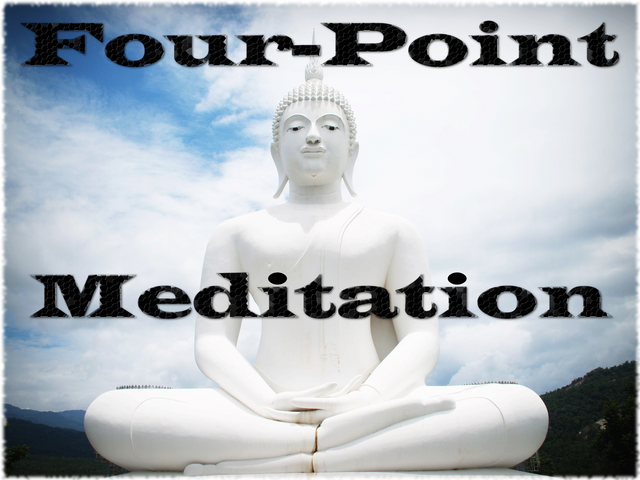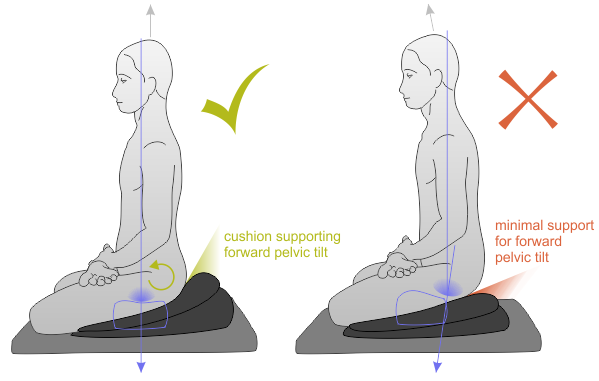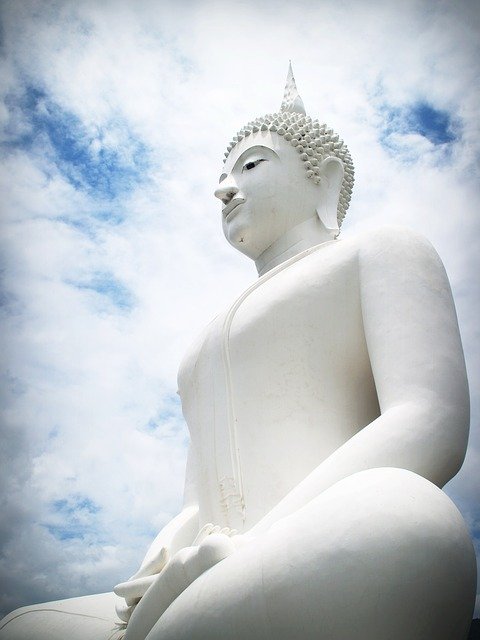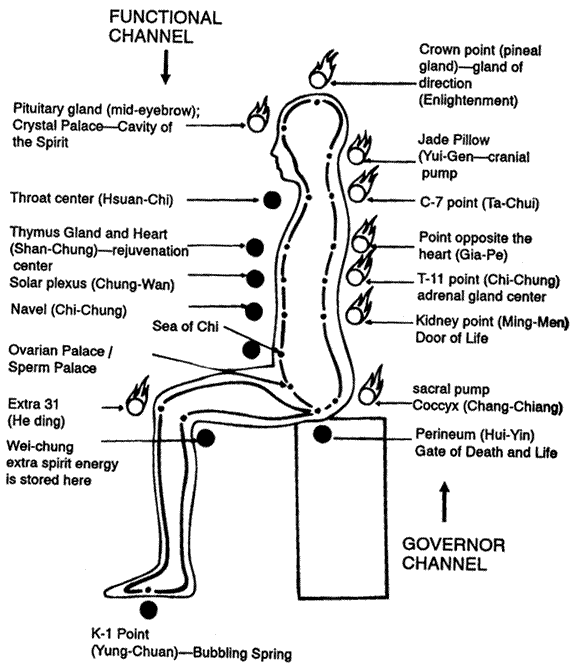☯ 🕉 Meditation: Four-Point Meditation ☯ 🕉
This version is similar to the seven-point meditation that is so commonly taught in the Lamrim. This four-point version was taught by Lama Je Tsongkhapa. Born in 1357 Tsongkhapa was a buddhist scholar and many believed him to be a saint. He passed in 1419. His focus was on bringing forth the best teachings from all traditions and making them available and spreading the Dharmas to everyone. He truly believe in these teachings from both Tibetan and Indian scholars and his intention was to spread them wide. This lead him to creating the Gelug monastery, where these specific teachings would be taught. It has since been moved from Tibet to South India. His main disciple was the first Dalai Lama Gendün Drup (1391–1474).

Some terms that I write about below can be hard to understand. Even the most experienced Monks can struggle with the complete understanding of Emptiness and even more to completely accept it. Within the seps below i hope that you can puzzle together an idea of what it mean. There really is not a simple definition but I can give something for you to start with. This voidness is, in one of many aspect, is the absence of a true identity for ourselves. For example the word "me" or "I". Sometimes refereed to as the "Ego." This in it self seems understandable but is only a small aspect of the great, powerful, and meaningful term of emptiness. I tried to avoid using it, which was difficulty, to keep it as simple as I could. Hopefully it is fully understandable.
Four-Point Meditation
- Object to be negated
- Understanding the delusion of the Object
- Proving that such does not exist in relation to the body-mind complex;
- Proving that such does not exist independently of the body-mind complex.
We will start this meditation with the normal procedure of relaxing the body and mind and setting our environment and posture. Make sure you are in a suitable environment for your level of experience of meditation. Sometimes it is useful to have some distractions but for as a first time time to be in a calm and quiet place. As I have said in past exercises you can sit however/wherever you want but a few things should be taken into consideration. First your posture should include a straight back allowing you to breath correctly and sitting comfortable. You can use a chair but its best to have your feet flat on the ground. If you sit on the ground many believe that you should sit with your legs crossed but I know of many who struggle with this. I am one and because of this I sit on a pillow or blanket and keep my legs parallel. Your posture should be so that its not a stress on your back and neck to sit straight. This can take a lot of practice.

So the first step of this meditation as far as reflection goes is to decide on the object to be removed. The idea is to want to remove delusional thoughts, especially related to the object. The concept of "I" or "Me" and its emptiness is what I will suggest you meditate on in this example. To start we need to breakdown this idea. This belief in "I" is said to be the main condition for all of the delusions and states of our mind. There is an amazing parable and explanation of this that I have to share. It is hard to come up with a better one then this:
Bring to mind thoughts of yourself. Include thoughts where you take yourself seriously. If someone called you a thief, how would you feel? If someone called you stupid, would you feel like an empty construct? If you saw US Treasury employees burn bails of retired old $20 bills, would you feel that great wealth was going up in smoke? Those pieces of paper are only $20 bills if the US Treasury designates them as such. Likewise, we are merely designated by thought, but there are occasions when we feel concrete. Try to remember or imagine such an occasion.
- From FPMT "Discovering BUDDHISM at Home"
So when it comes to the next point we must recognize this object. This is very important. We are going to be meditating on this so we must understand it. The meditation will be a combination of analytical and single-pointed. Analytical in that we must analysis these delusions fully and the latter because we must be able to really focus our attention. In Buddhism it is important to do everything with 100% focus and attention, to do everything with every ounce of effort we can muster.
We use the following to ascertain whether something is delusional or not.
- As inherently separate from the aggregates of body & mind
- As inherently one with the aggregates of body and mind
- As both separate and one
- As neither separate nor one

CC0 Pixabay.com
The Aggregates are that of Form(matter), Feelings or Sensations, Perceptions, Mental Formations or Thought Process and Consciousness. The physical parts of us are part of the form; eye, ear, nose, tongue and body and represent the form aggregate.
The third point is understand that such does not exist in relation to the body-mind complex. Establishing that the inherently existent "I" does not exist as one with either the mind or the body that are its basis of imputation. This is accomplished by examining our our body and mind as well as stepping back and discover how we sense "I." We can say through analysis that this relation does not exist by looking at this phrase "my body." This understanding is saying that we cannot say "my body" as long as "me" and "body" are the same.
The fourth is establishing that the inherently existent "I" does not exist as something different from the exaggerates of mind and body that are its basis of imputation. Through meditation and analysis we can see that it is impossible to say that the "I" we use regularly is completely different from the aggregates. If we did then we couldn't say , "I am sick," my arm is broken," or "my head hurts." Because of this an "I" that exists as something inherently different from the exaggerate is not reasonable.
Read this through and try meditating on this. The teachings of the four-point meditation state clearly that it is reasonable for this process to take way longer than one meditation session to get the full potential and grasp of it. It is easy believed to take months or years to understand just the first point. So take these and start thinking about it and meditating on them.
I hope you enjoyed this lesson and explanation.

There is no philosophy which can exceed Buddha's philosophy.
Keep it up, you are doing great my brother.
Thank you my friend.
You are always welcome :))
Thank you for sharing @nicnas! Resteemed
Thanks :-)
Regarding posture, I used to struggle with the lotus position many years ago, then gave up! In Taoist meditations they actually promote sitting on a chair as being better for the base chakra as it doesn't touch the ground. This made me think about postures in terms of climate - cold damp places, like much of China or Europe, do not promote lotus sitting. Just some thoughts for others who find the pain can be a hindrance to meditating.
I have some knee issues and have used a chair often. When i felt uncomfortable in a chair I would sit on a large pillow with my legs parallel. I dont think ill ever be able to do full lotus. I had not heard of that about sitting in a chair. Thanks for that knowledge. Always learning something new. Always appreciate you stopping by @rycharde
Look at an image like this:

better than me trying to explain it.
There are some Dzogchen meditations I learnt that require props like a belt and crutch etc. All of it to gain stability while stimulating certain chakras.
I have to go to bed but I'm going to reply with some kinda smart reply tomorrow, ha. I did do a 10 day vipassana retreat 15yrs ago. It was a great experience.
Yeah those retreats are amazing. Thanks for checking out my post and ill look forward to a "smart reply" tomorrow.
Very very good @nicnas !!! Resteeming
Thank you, that means a lot.
It all starts from nothingness...the original triple blackness
Thank you for reading and commenting bud. @opinizeunltd i always appreciate it.
Explained in details!!
I hope you like it my friend @uday625
yes we definitely have a lot of similar interests! love your insight. Im so excited to see more from you!
Thank you. I am glad you found your way to my post. I remember loving that post of yours about Being a good listener
Great
Thank You!